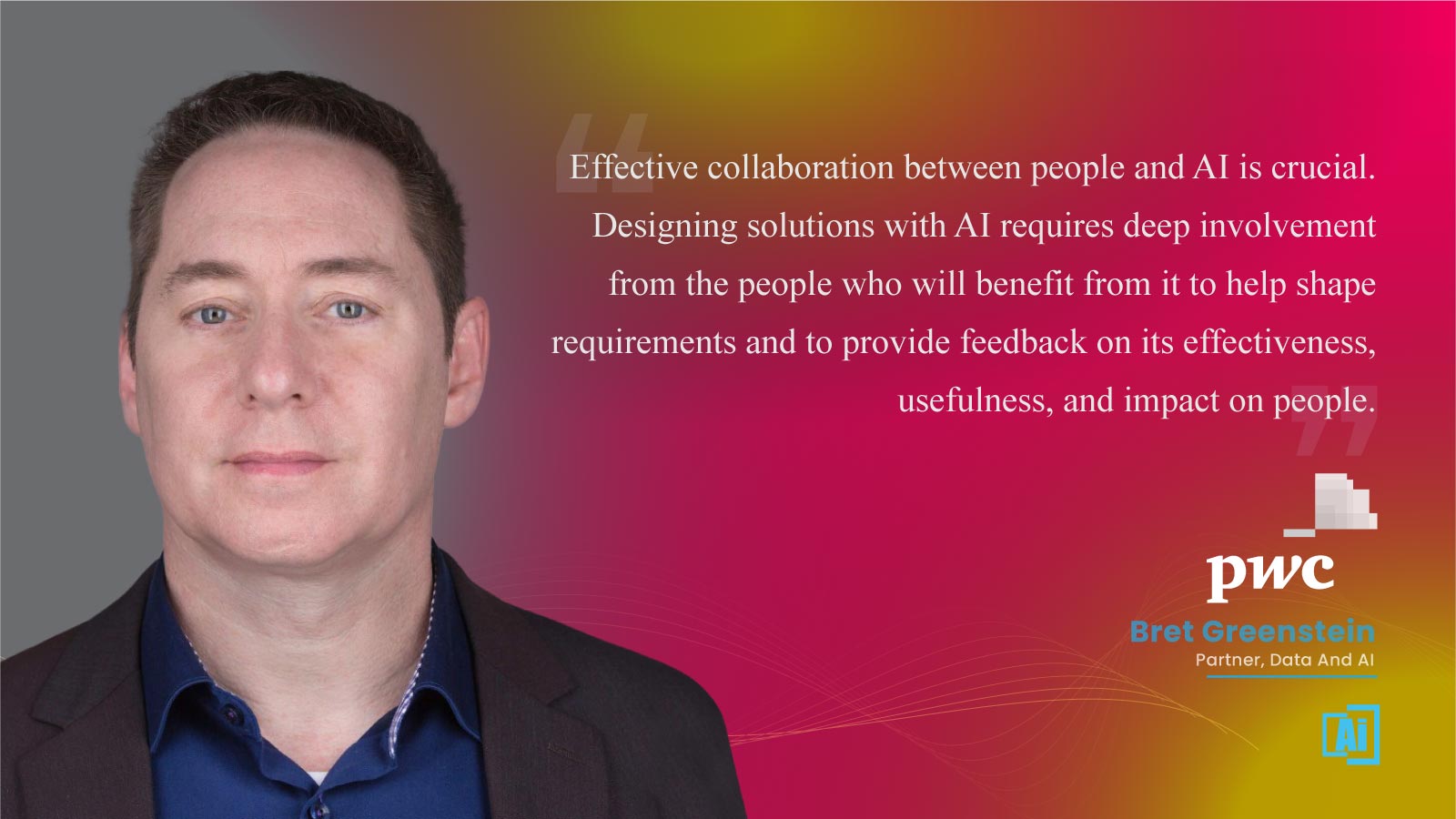AiThority Interview with Bret Greenstein, Partner, Data & AI at PwC

Please tell us about your current role at PwC. How did you arrive at this company?
I currently serve as a Cloud and Digital Partner focused on AI and Data.
I have been at PwC for two years now. I came to PwC after following a career inspired by how AI, Data, and technology impact business. I led multiple new technologies as they came to market over the years including early cloud computing, the Internet of Things, and Watson. And, I later worked in services roles to help apply these technologies to transform business.
AI trends have completely changed in the last 2 years. Could you tell us about the key challenges for the AI development and research teams looking to build a more human-led technology infrastructure?
Building a more human-led technology infrastructure in AI, while beneficial, also presents several key challenges and considerations for researchers and IT teams. One of the biggest challenges until recently, was that AI was considered a deep technology limited to data scientists. This made it harder to engage people who could think about the human side of AI. At its core, AI is a tool that helps people work in new ways, so understanding the intersection of the human experience with technology is essential to ensure it delivers value and has a positive impact on people, businesses, and society.
Given the power and scale of AI, ethical considerations are paramount. Before even harnessing the power of AI, leaders, and workforces need to understand where it should be applied and how to establish guardrails that consider the potential impacts of bias, privacy, and transparency in AI systems. Additionally, data quality is critical to delivering quality AI solutions.
So, it must be carefully addressed to ensure diverse and unbiased datasets are used in training.
Effective collaboration between people and AI is also crucial. AI is a tool designed to be used to augment and amplify the work of people. So, designing solutions with AI requires deep involvement from the people who will benefit from it to help shape requirements and to provide feedback on its effectiveness, usefulness, and impact on people. AI systems change over time based on changing data and training, so this is a constant process of human engagement and feedback.
By actively tackling these challenges, AI development teams can strive to create AI systems that empower humans, operate ethically, and contribute positively to society.
Recommended: AiThority Interview with Brigette McInnis-Day, Chief People Officer at UiPath
What is a good way to harness AI for businesses? What are the inherent challenges for businesses looking to start from scratch with AI and machine learning?
Utilizing AI can bring significant advantages to businesses, accelerating and automating work, improving the quality and consistency of content and communications, enhancing customer experiences, and helping unlock insights from the vast amount of unstructured data in the enterprise. AI empowers businesses to improve operations and streamline processes, resulting in cost reduction and improved speed and scale.
However, there are challenges for businesses starting from scratch with AI. Skill gaps in data science and machine learning may require investment in upskilling or hiring experts. Data quality is crucial, as AI relies on accurate and unbiased data. Ethical considerations around privacy, fairness, and transparency must also be addressed. Adding to this, integration with existing systems can be complex, requiring seamless incorporation of AI solutions into established processes. If any of these factors are overlooked, businesses can expect these issues to manifest themselves into much bigger challenges.
However, when organizations proactively recognize and address these challenges, businesses can use AI to open doors to enhanced decision-making capabilities, improved productivity, and a competitive edge in today’s data-driven business landscape.
AI practices are now influenced by new techniques to generate new AI models and orchestrate new workflows. Could you tell us how PwC sees generative AI as a key enabler in AI development and orchestration?
Generative AI has greatly expanded the ways that AI can be applied to a wide range of use cases. Using Foundation models and extending them with your own proprietary data, generative AI can transform business processes. As a result, it is often combined with applications, analytics, and traditional AI/ML to enable new workflows. Those workflows can transform almost all knowledge work.
At PwC, we see generative AI as a catalyst for innovation, enabling AI systems to generate new content, make intelligent decisions, and enhance the overall capabilities of AI development and orchestration. Its potential to expand the boundaries of AI applications and drive advancements in various fields makes it a key enabler in the ongoing development and advancement of AI technologies.
Recommended: AiThority Interview with Michael Schmidt, Chief Technology Officer at DataRobot
You recently announced $1b funding into AI. Please tell us more about this initiative and how it would accelerate AI innovations in your industry.
Our $1B investment will expand and scale our AI offerings and help our clients and partners reimagine their businesses through the power of generative AI. This investment features an industry-leading relationship with Microsoft, creating scalable offerings using OpenAI’s GPT-4/ChatGPT and Microsoft’s Azure OpenAI Service.
While we recently announced this investment, PwC’s dedication to AI innovation is not a recent development.
PwC has consistently prioritized and invested in AI, reinforcing our capacity to provide solutions that combine human expertise with technological advancements. Our focus on AI empowers us to deliver innovative, human-led, and technology-powered solutions, fostering confidence among our clients and driving sustainable outcomes. Through ongoing investment and strategic efforts, PwC remains committed to staying at the forefront of AI advancements and leveraging its transformative potential to meet the evolving needs of our clients.
Furthermore, PwC will invest in upskilling opportunities for its workforce of 65,000 individuals, equipping them with the necessary skills and expertise in AI tools and capabilities. This initiative aims to enhance their productivity, enable smarter work practices, foster career growth, and empower them to provide valuable guidance to clients regarding the advantages of AI and other transformative technologies.
We are expecting to see this investment have a significant industry-wide impact on accelerating AI innovations, driving transformation, and unlocking new opportunities for businesses and society as a whole.
Your message to CEOs and business owners who want to accelerate sales revenue with AI products and services:
CEOs and business owners must first start by understanding what Generative AI can do. Becoming “AI aware” is a critical skill for business leaders now as they prioritize their investments and shape their business strategy.
Generative AI has the potential to create new business models and enable disruptive new players in most industries.
Once the CEOs see what it can do, they should focus on identifying where AI can have the most impact. To identify these areas, leaders can start by examining processes that are currently time-consuming, repetitive, error-prone, or involve complex data. By undertaking this critical step, leaders can lay the foundation for successful AI implementation and ensure that AI technologies are deployed where they can make the most meaningful difference.
Leaders should begin now, even with small-scale implementations, to build organizational learning and skills as they test AI solutions to optimize their effectiveness and avoid any large-scale mistakes. Additionally, leaders should seriously consider training and upskilling their sales team to effectively utilize AI.
Leaders should also seriously consider what their governance strategy will entail. According to PwC’s recent Trust Survey, nearly all business leaders say they are prioritizing AI-related initiatives, but only 35% of executives say their company will focus on improving the governance of these AI systems. Without strong and ethical guidelines, organizations risk unintended consequences, ethical dilemmas, and potential harm.
It is important to note that AI is not a one-size-fits-all solution. CEOs and business owners must tailor their AI initiatives to their unique business needs and industry dynamics. Leaders should embrace the transformative potential of AI, all while having a responsible-centric focus, and they’ll be well-positioned to accelerate their sales revenue in the evolving business landscape.
Recommended: AiThority Interview with Rob Walker, President of Global Growth Markets at Cognizant
Thank you, Bret! That was fun and we hope to see you back on AiThority.com soon.
[To share your insights with us, please write to sghosh@martechseries.com]
Bret Greenstein is PwC’s US Data, Analytics and AI Leader. He has worked for over 25 years helping clients to transform through the adoption of new technologies, including AI, Data, Internet of Things, and Cloud, to deliver new business models and new ways of working.


Comments are closed.